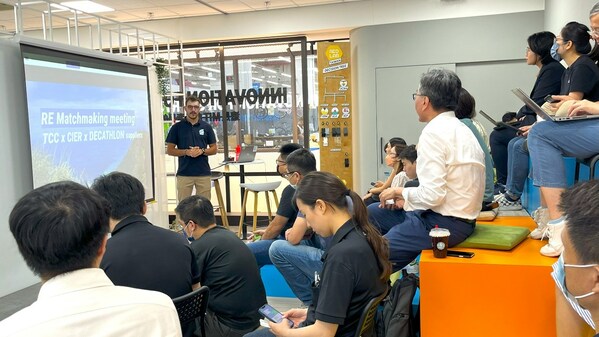Taiwan’s Solutions for Supply Chain Decarbonization and Renewable Electricity Procurement for SMEs
TAIPEI, Sept. 4, 2023 /PRNewswire/ — Taiwan's small-and-medium-sized enterprises (SMEs) are struggling to compete for renewable electricity, but recent developments invite promising solutions. SMEs are shut out of a major procurement method, power purchase agreements (PPAs), due to low electricity consumption. Meanwhile, energy developers are struggling to find companies that are willing and able to buy large energy loads. However, an aggregated PPA (APPA), as posed by the report, "Taiwan Energy Market Briefing: Net-Zero Plan and Aggregated PPAs" could be the key to both barriers. An APPA consists of two or more companies accumulating their electricity usage, which lowers the price, to negotiate a contract with energy developers.

The RE matchmaking meeting co-organized by CIER, Decathlon, and TCC.
Many SMEs and suppliers are now being required to transition to renewable electricity in large part due to initiatives like RE100. The RE100 membership includes over 400 of the world's most influential companies that have committed to using 100% renewable electricity. RE100's Local Campaign Partner, Chung-Hua Institution for Economic Research (CIER), was the writer of the aforementioned report. Taiwan's RE100 Representative from CIER, Alisha Lee, said, "CIER sought out to research APPAs as a solution to consumption and cost issues. Although it once seemed difficult to achieve, companies are now breaking through the barriers and are proving the APPA model is possible and successful."
Decathlon, a leading global sports company and RE100 member, has helped develop an APPA for its suppliers in Taiwan, pioneering the use of APPAs in the region. CIER supported Decathlon's efforts, commissioned by Industrial Development Bureau (IDB), by finding energy developers that are willing to also lead in APPAs. Decathlon then spent six months communicating and negotiating with its suppliers, and in the end, brought several key suppliers coming mainly from the bike industry to the table.
To achieve Decathlon's ambition of reducing its carbon footprint by 20% by 2026 (compared to 2021), working on renewable energy with suppliers is one of the main levers. Arthur Wittouck, Taiwan Sustainability Production Leader at Decathlon, said, "The goal of APPA is to find some solutions together with our partners to increase the renewable energy consumption at our suppliers level in order to reach our ambition. Although it is particularly difficult, let us be, with Decathlon, a driving force and a beacon of light for a sustainable future."
The renewable energy developer tied to the APPA is Energy Helper Taiwan Cement Corporation (TCC). In addition to the APPA, TCC has also demonstrated another way to address SME's procurement issues by pledging to provide a percentage of its energy to SMEs. Nelson Chang, Chairman of TCC, said that "[he wants] to ensure that everyone can obtain affordable and sustainable renewable energy."
While SMEs require smaller energy loads than larger companies, they are facing more challenges in sourcing renewable energy in Taiwan. APPAs like the one signed by Decathlon's suppliers and pledges like TCC's to assist SMEs are important developments in Taiwan to continue to make renewables more accessible.
.gif)









